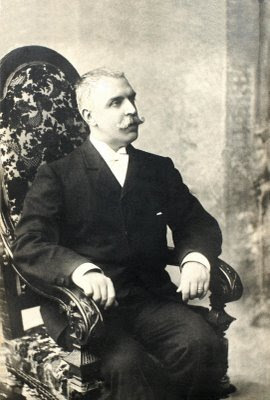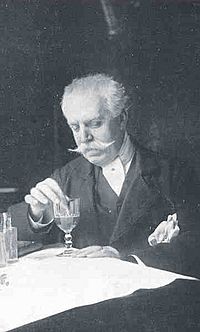Manuel González Prada facts for kids
Quick facts for kids
Manuel González Prada
|
|
|---|---|
 |
|
| Born | January 5, 1844 |
| Died | July 22, 1918 (aged 74) Lima, Peru
|
| Burial place | Cementerio Presbítero Matías Maestro |
| Alma mater | Real Convictorio de San Carlos |
| Known for | Influences on indigenismo and Peruvian nationalism |
| Political party | National Union |
Jose Manuel de los Reyes González de Prada y Ulloa (born January 5, 1844 – died July 22, 1918) was an important Peruvian writer, politician, and thinker. He was one of the first to openly criticize the powerful elite in Peru. He helped shape Peruvian ideas in the early 1900s and influenced a writing style called modernismo. He also directed the National Library of Peru.
González Prada was born into a wealthy, upper-class family. He was friends with other important writers like Clorinda Matto de Turner and Mercedes Cabello de Carbonera. These writers also questioned society and traditional ways of thinking.
Contents
Who Was Manuel González Prada?
Early Life and Education
Manuel González Prada was born in Lima, Peru, on January 5, 1844. His family was very rich and came from a long line of Spanish nobles. His father, Francisco González de Prada, was a judge and even the Mayor of Lima.
Because his father was exiled for a time, Manuel's family lived in Valparaíso, Chile, where he started school. As a young man, he dropped the "de" from his name. This showed he didn't want to be linked to his family's noble past.
When his family returned to Peru, he studied at the Seminary of Santo Toribio. Later, he went to the more open San Carlos Convictorium. There, he studied law and literature. He spent most of his life in Lima, a city with many old Spanish traditions.
A Time of Change and Travel
After his father died in 1863, González Prada lived on his family's farm, called Tutumo, until 1869. During this quiet time, he experimented with chemistry and became a better poet. He also read many political books from Europe, which greatly influenced his ideas.
He also traveled through Southern Peru, especially near Cerro de Pasco. There, he met farmers and native people. This made him dislike centralismo, which was the idea that Lima had too much power over the rest of the country.
The War of the Pacific and Its Impact
In 1879, just before Chile invaded Peru, González Prada published a book called Cuartos de hora. In it, he criticized Peru's ruling class and the Catholic Church.
During the War of the Pacific, when Chile occupied Peru, González Prada stayed in his home for three years. He refused to even look at the Chilean soldiers. The war showed him that Peru was failing because of its wealthy leaders. He believed big changes were needed for the country to improve.
He said that businessmen, religious leaders, military officers, and politicians made up the upper class. He believed they got their wealth and power unfairly, through what he called "crony capitalism" (where friends in power help each other get rich). He saw two types of powerful elites:
- Civilian leaders who stole public money.
- Military leaders (called caudillos) who openly took money from the government.
He felt these elites used the police and military to stop people from speaking out. He also thought they were disconnected from most Peruvians. They kept Spanish customs and old colonial practices, like feudalism, which led to unfairness and poor development in rural areas.
Leading a Literary Movement
González Prada was a founding member of the Peruvian Literary Circle. This group wanted to create new literature based on science and looking to the future. They saw themselves as freethinkers who would change Peru.
González Prada quickly became a leader of the group. In 1886, he said, "I see myself, from this day on, at the head of a group destined to become the radical party of our literature." He encouraged them to look forward, not backward.
On July 28, 1888, his famous Speech at the Politeama was read aloud. It was so powerful that President of Peru Andrés Avelino Cáceres wondered if he should arrest González Prada or hug him! The government tried to stop the speech from being published, but they failed.
His most famous book, Free Pages, caused a huge stir. It was so critical of the Catholic Church that González Prada almost got kicked out of the Church. He said the Church "preached the sermon on the mount and practiced the morals of Judas." He was part of a group of reformers, including Ricardo Palma and Juana Manuela Gorriti, who worried about the lasting influence of Spanish rule in Peru. González Prada was perhaps the most radical of them all.
Political Ideas and the National Union
González Prada first belonged to the Civilista Party. But he left it to start a new, radical party called the National Union. This party focused on spreading new ideas and challenging the old ways. The Literary Circle even turned into the National Union in 1891.
He was chosen as a candidate for president. However, he had to leave Peru and go to Europe because he was being persecuted. He spent seven years visiting France and Spain. When he returned to Peru in May 1898, he called for a "social revolution" and "the greatest liberty" through social changes.
He ran for president in 1899 but came in third place. After the election, he was asked to work for the new government. In 1902, he left the National Union and started writing for newspapers that supported working-class people. In 1904, he wrote for Los Parias, a Peruvian anarchist newspaper. He also became the director of the National Library of Peru, which he helped improve and organize into an important international library.
Later Years and Legacy
González Prada's books Minúsculas (1901) and Exóticas (1911) are seen as examples of modernista writing. His poetry was very new and creative for its time, using different rhythms and styles. His book Baladas peruanas (1935), published after his death, supported the rights of indigenous people.
Until he died, González Prada taught university students and workers. He held discussion groups called Luz y Amor (Light and Love) and shared his writings. He died of a heart attack on July 22, 1918, and was buried as a Peruvian patriot. His book on Anarchism, Anarquía, was published in 1936 after his death.
His Big Ideas
After returning from Europe in 1898, González Prada supported anarchism. He believed it offered more freedom than liberalism, which he felt had failed to bring real change in Peru. He shared similar anarchist ideas with thinkers like Pierre-Joseph Proudhon.
He was an atheist (someone who doesn't believe in God) and followed the ideas of scientists and philosophers like Darwin and Comte. He was a strong debater who criticized the Catholic Church, Spanish traditions, and any form of conservatism. He described anarchism as "a new Christianity... without Christ." He believed it would bring "unlimited freedom and the greatest well-being for the individual" by getting rid of the government and private property.
González Prada didn't see Peru's problems as just a class conflict. He thought that one group gaining power over another would not truly lead to social justice. He warned that "revolutions come from above, but are made operative from below... every revolution once successful tends to become a government of force, every victorious revolutionary degenerates into a conservative."
After seeing how nationalism failed and after embracing anarchism, he concluded: "Given the general inclination of man to abuse power, all government is evil and all authority means tyranny."
Why He's Remembered
González Prada's impact wasn't fully recognized until later in the 20th century. His ideas influenced progressive movements in Peru. His writings also helped shape indigenismo, a movement that focused on the rights and culture of indigenous people, because he criticized the strong Spanish influence among Peru's elite.
A scholar named Bohdan Plaskacz called González Prada "one of the greatest essayists of Latin America." He was a champion for the rights of Peruvian indigenous people and a "spiritual father" to the socialist movement that came after him. Important Peruvian thinkers like José Carlos Mariátegui and Víctor Raúl Haya de la Torre were influenced by him.
Thomas Ward, a director at Loyola University Maryland, said that González Prada was a voice that "rose up against pusillanimity [cowardice], against the lack of principles, the Creole concept of Peru excluding the Andean." This means he spoke out against weakness and unfairness, especially how the Peruvian elite ignored the Andean people.
Besides being a philosopher and political activist, González Prada was important as the first Latin American author to write in a style called modernismo. He also introduced new poetic forms, which made Spanish poetry more exciting. He also wrote essays and some fiction.
Famous Words
Here are some of González Prada's well-known quotes:
- On Peru: "We have never initiated a reform, never announced a scientific truth, nor produced an immortal book. We do not have men but mere echoes of men, we do not express ideas but repetitions of decrepit and moth-eaten phrases."
- On Revolution: "Revolutions come from above but are carried out from below... Rights and freedom are never granted; they must be taken."
- On Liberty: He believed "that all liberty was born bathed in blood... Those who command give only what they must, and nations which sleep trusting their rulers to arouse them with the gift of liberty are like fools who build a city in the midst of a desert hoping that a river will suddenly flow through its barren streets."
See also
 In Spanish: Manuel González Prada para niños
In Spanish: Manuel González Prada para niños
 | Emma Amos |
 | Edward Mitchell Bannister |
 | Larry D. Alexander |
 | Ernie Barnes |


